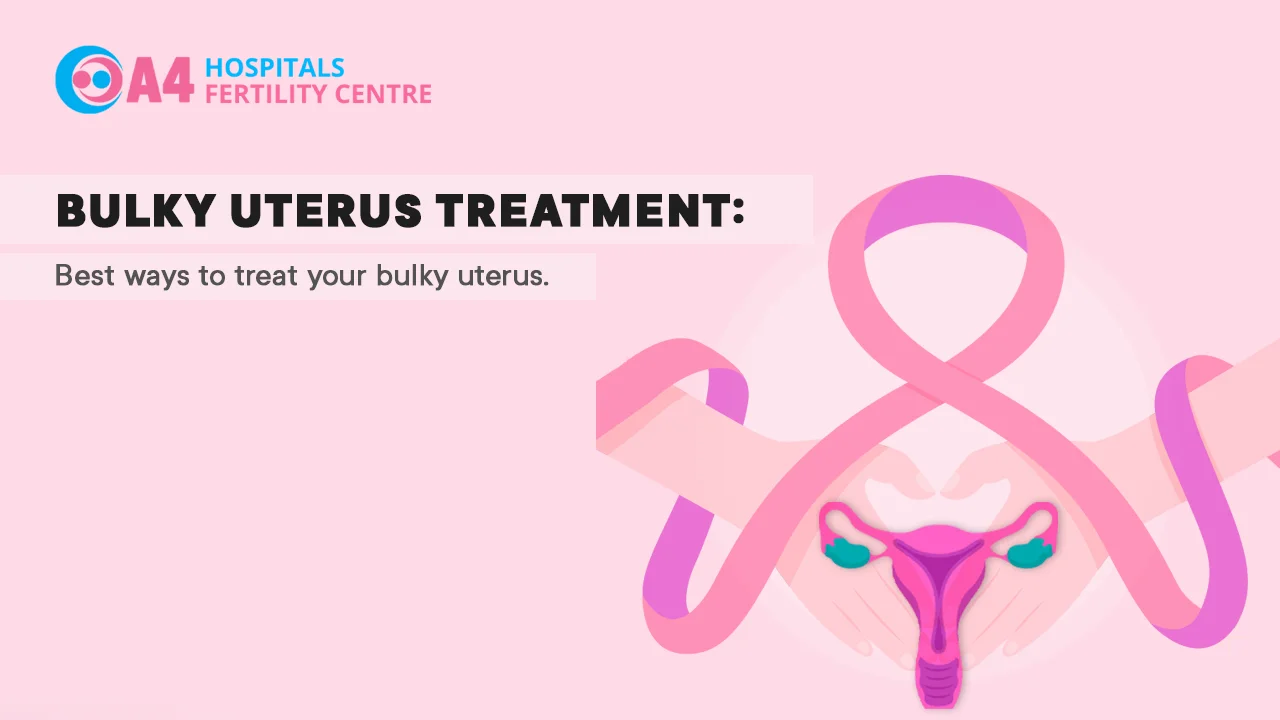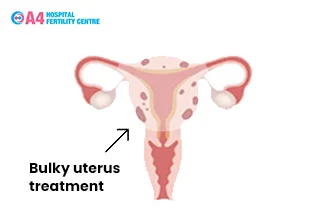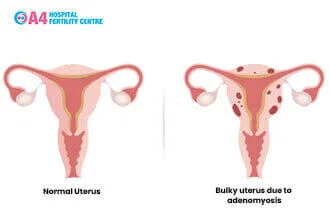
Dr. Aruna Ashok MBBS, MS OG, DNB OG
- Clinical Director

Welcome to the A4 Fertility Centre blog, where we strive to provide comprehensive information on reproductive health and fertility treatments. In this article, we will delve into the topic of treating a bulky uterus and explore effective strategies for restoring reproductive health. A bulky uterus, characterized by an abnormal enlargement of the uterus, can have a significant impact on a woman's fertility and overall well-being. Understanding the causes behind this condition and the available treatment options is essential for individuals seeking to address this issue.


Throughout this article, we will discuss the various causes that can contribute to the development of a bulky uterus, including uterine fibroids, adenomyosis, uterine polyps, endometrial hyperplasia, and adhesions. By understanding the underlying factors, individuals can gain insight into their specific condition and make informed decisions regarding treatment.
Furthermore, we will explore the best treatment options available for managing a bulky uterus. These include medical interventions such as hormonal medications, minimally invasive procedures like hysteroscopy and uterine artery embolization, surgical interventions such as myomectomy and hysterectomy, as well as fertility treatments like in vitro fertilization (IVF). By discussing these approaches, we aim to provide individuals with a comprehensive overview of the available treatment options, enabling them to make informed choices about their reproductive health.
Join us as we delve into the world of treating a bulky uterus and discover the most effective strategies for restoring reproductive health and optimizing fertility.
A bulky uterus refers to an abnormal enlargement of the uterus beyond its usual size. The uterus is a pear-shaped organ located in the pelvis, responsible for nurturing and supporting a growing fetus during pregnancy. In a non-pregnant state, the uterus typically measures around 6 to 8 centimeters in length, 4 to 5 centimeters in width, and 2 to 3 centimeters in thickness. When the uterus exceeds these measurements, it is considered bulky or enlarged.
Several factors can contribute to the development of a bulky uterus. Understanding the underlying causes is crucial for determining the most effective treatment approach. Here are the primary causes:
Fibroids are noncancerous growths that form in the uterus. These benign tumors can vary in size and number, causing the uterus to become bulky. Fibroids are influenced by hormonal factors and can result in heavy menstrual bleeding, pelvic pain, and pressure.
Adenomyosis occurs when the tissue lining the uterus (endometrium) grows into the muscular wall of the uterus. This condition causes the uterus to become bulky, resulting in heavy or prolonged menstrual bleeding, severe cramping, and pelvic discomfort.
Polyps are small, benign growths that develop on the inner lining of the uterus. When these polyps increase in number or size, they can cause the uterus to become enlarged. Uterine polyps can lead to irregular menstrual bleeding, bleeding after intercourse, and infertility.
Endometrial hyperplasia refers to the excessive growth of the uterine lining. This condition can result from hormonal imbalances, such as an excess of estrogen relative to progesterone. The thickened endometrium causes the uterus to become bulky and can lead to heavy or irregular menstrual bleeding.
Adhesions are bands of scar tissue that can form inside the uterus due to previous surgeries, infections, or inflammation. These adhesions can cause the uterus to become distorted or enlarged, resulting in fertility problems and menstrual irregularities.
The treatment for a bulky uterus depends on various factors, including the underlying cause, severity of symptoms, and a woman's desire for future fertility. Here are the best treatment options:
Hormonal medications can help regulate hormonal imbalances and manage symptoms associated with a bulky uterus. Progestin therapy, hormonal birth control, or gonadotropin-releasing hormone (GnRH) agonists can be prescribed to control heavy bleeding, reduce the size of fibroids, and alleviate pelvic pain.
Hysteroscopy : A hysteroscopy is a minimally invasive procedure that involves inserting a thin, lighted instrument called a hysteroscope through the vagina and cervix to visualize the inside of the uterus. It allows for the removal of polyps, fibroids, or the performance of endometrial ablation to treat adenomyosis.
Uterine Artery Embolization (UAE) : UAE is a non-surgical procedure that involves blocking the blood supply to the fibroids, causing them to shrink and reducing the size of the uterus. It is an effective alternative to surgery for women who want to preserve their fertility.
Myomectomy : A myomectomy is a surgical procedure that involves the removal of fibroids while preserving the uterus. It is an ideal option for women who wish to conceive in the future. Myomectomy can be performed through various approaches, including laparoscopy, hysteroscopy, or open abdominal surgery.
Hysterectomy : In severe cases or for women who have completed their family planning, a hysterectomy may be recommended. Hysterectomy involves the removal of the uterus and can be performed through minimally invasive methods or traditional open surgery.
In Vitro Fertilization (IVF) : IVF is a widely used fertility treatment that can bypass any structural abnormalities in the uterus. It involves fertilizing the eggs with sperm in a laboratory and transferring the resulting embryos into the uterus. IVF can be an effective option for women with a bulky uterus who are struggling with infertility.
A bulky uterus can affect a woman's reproductive health and fertility. However, with advancements in medical science, there are various treatment options available. Understanding the causes and seeking appropriate treatment from a qualified healthcare professional is essential. At A4 Fertility Centre, we provide comprehensive care and personalized treatment plans for individuals with a bulky uterus. Remember, timely intervention and proper management can improve reproductive health, enhance the chances of conception, and pave the way for a successful pregnancy.